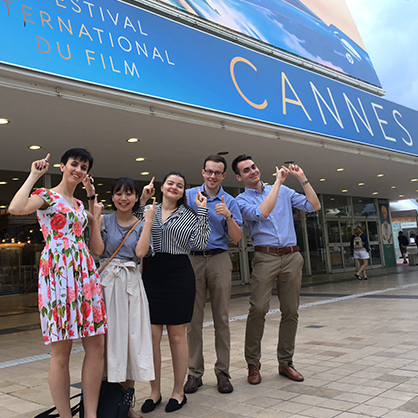

Projected media and communications openings each year, by 2034
Median annual wage, higher than median for all occupations
Distinct concentrations within our degree
Pretty much anything you’re passionate about! And you’ll hit the ground running at the University of New Haven. When you major in Communication, our program will prepare you to be an innovator in entertainment, film, multiplatform journalism, public relations, and mass media, including television, radio, and podcasting.
Choose from concentrations in:
You can also get on the fast-track to an advanced degree:
Earn your degree in Communication and a Master of Business Administration (MBA) in just five years with our 4 plus 1 option. Jump start your career with the University of New Haven accelerated degree program, designed to give you the specialized skills you need to creatively and successfully adapt to the continuing evolution of both interpersonal and mass communication. Students who are adept at both communication and business graduate with two valuable academic and professional skill sets.
Study for a bachelor’s degree in communication at University of New Haven and you will experience limitless opportunities that will prepare you to enter this exciting field with confidence.
Want to gain an edge in the communication industry? Want to be on employers’ Most Wanted list? Here are four experiences you won't want to miss!
The professors in CFMS have “been there”, in fact most still are. They report, anchor and produce news, sports and entertainment. They’ve won Emmy awards and Pulitzer Prizes. They write newspaper columns, best sellers and screenplays. They produce top rated podcasts, and direct feature films, documentaries and music videos.
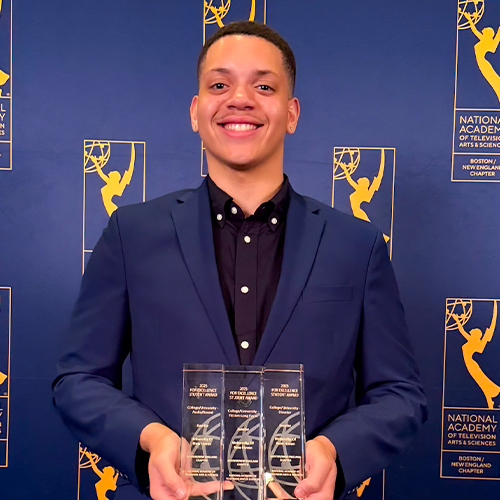
Charger Filmmaker Wins Big in Prestigious Student Production Awards
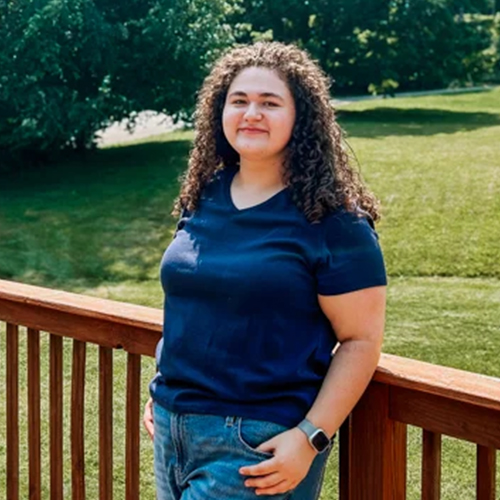
Student Journalist Reflects on Winning First Place in Writing Contest

‘There Was No Doubt that I Was Prepared For This Role’
Producers and Directors
4.9% Growth 2024-2034
Director of Communications
5% Growth 2024-2034
Public or Media Relations Specialists
4.8% Growth 2024-2034

The University’s partnership and collaboration with Fox61 provides communication students with unprecedented opportunities. Our students now have access to the day-to-day workings of a top-rated news outlet located right here on campus. From this unique vantage point—in addition to the student internships Fox61 provides—students will learn, first-hand, how news is gathered, produced, and broadcast.
This course provides in-depth study, practice, and practical application of techniques, theory, and operational skills used to create and produce various types of video productions in a television studio environment. Individual and team-based approaches using live and recorded formats will be highlighted at an introductory level. Designed for TV/Video and Film track concentrations.
The creative process involved in translating the narrative screenplay into film is explored. Advanced techniques in pre-production, physical production and post-production are used to produce narrative films and prepare them for distribution and exhibition.
Provides an overview of the opportunities and challenges in today’s global co-production market. Emphasis is placed on international co-productions, presale contracts, daily and weekly studio production expense reports, and the packaging and distribution of content across all platforms.
Intensive practice in news gathering, interviewing, researching, editing, writing, and use of news services and sources in a media-convergent world to produce broadcast and web-ready stories. Discussion and application of traditional versus alternative journalism such as backpack, hyper-local, and web-based. Application of ethical journalistic standards in fairness and accuracy. Documentary, special event, and live production elements are examined and created for multiple media formats.
Students will complete their own photo based slow journalism projects, study the history of photojournalism, its impact on public affairs, its ethics, and the practice of the craft from its inception to current day. Students will study iconic images that helped shape societal change and hear from practicing photojournalists.
Research and produce CrimeWaves, a top ten true crime podcast. Receive hands on instruction in investigative techniques with Professor Declan Hill, author and investigative journalist, and audio production with long-time Connecticut radio personality Bruce Barber.
How can the story of a single refugee change political policy or the words of a domestic abuse victim impact local law enforcement? Students learn when to ask questions and how to listen so that others may speak. How to craft words and images into powerful professional media pieces. For students who aspire to make a difference in a divided world, to give voice to the silent, and raise up the ignored.
Every day communication experts – particularly journalists – make split second decisions about right and wrong. They apply media ethics which are explored in this interactive online class.
The Presidential Daily Briefing is newsletter produced to keep the President of the United States informed about all threats to the country and all opportunities to advance U.S. interests. In this information saturated world, the PDB format is becoming popular as a way to deliver news and to communicate internally within businesses and organizations. Mastering this writing style is a sure way to stand out in journalism, public relations, or as a communicator inside any organization.
Exposes students to the history and best practices in the field of public relations. Students learn how to develop public relations campaigns of various types; produce common public relations tools, such as news releases, opinion articles, talking points, and speeches; learn how to act as a spokesman for a person, organization, or cause; and understand the management of a public relations crisis.
The University of New Haven offers a wide variety of in-depth courses that create a transformational educational experience for our students. To view the complete list of courses you'll take while pursuing a Bachelor of Arts or Science in Communication, check out the Academic Catalog:
Communication, B.A. - Film Production and Media Entrepreneurship Concentration
Communication, B.A. - Multi-Platform Journalism and Media Concentration
Communication, B.A. - Public Relations and Digital Media Concentration
Communication, B.A. - Sports Media and Production Concentration
Get an inside look at what differentiates the University of New Haven and how your experiences as a student will prepare you for success.

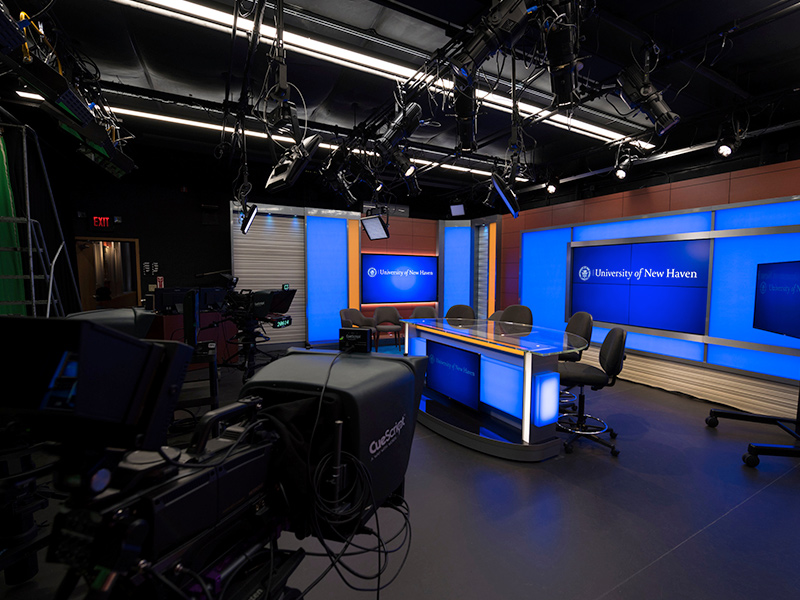


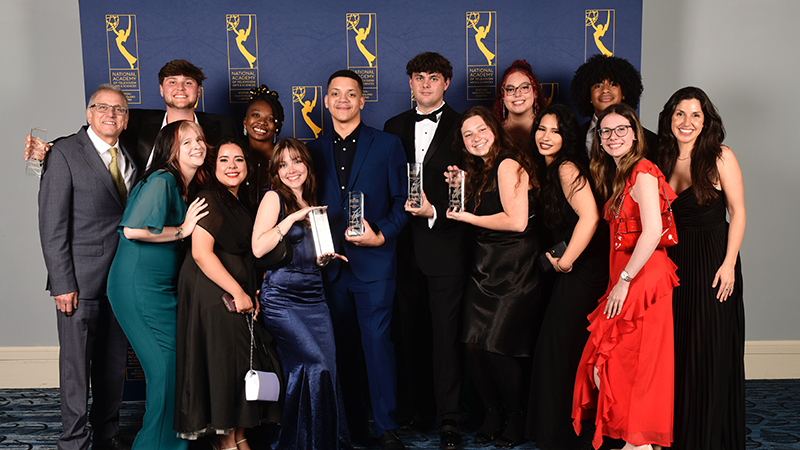
The Charger Blog
With six wins and three honorable mentions, University of New Haven students were recognized by the Boston/New England Chapter of the National Academy of Television Arts and Sciences for their exceptional storytelling, direction, cinematography, and editing across fiction and nonfiction films.
Whether you're still in high school or are transferring from another college, we offer full- and part-time opportunities for undergraduates from inside the U.S. and abroad. The admission process can begin as early as the end of your high school junior year.
The Application Process
We offer a comprehensive financial aid program, with students receiving assistance in the form of grants, scholarships, student loans, and part-time employment. Funds are available from federal and state governments, private sponsors, and from university resources. More than 85 percent of the University's full-time undergraduate students receive some form of financial assistance.
Learn More